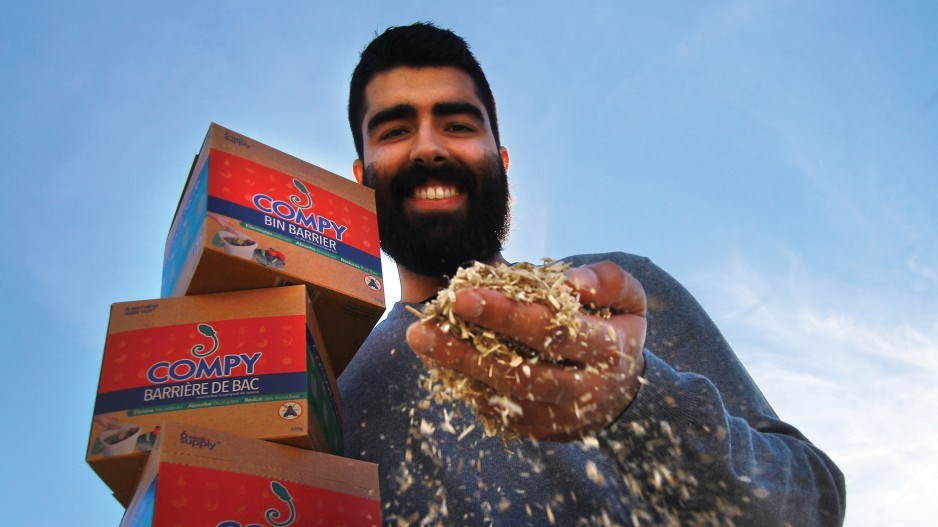We’ve all heard the stories of big companies that got their start in someone’s garage – Amazon (Nasdaq:AMZN) and Apple (Nas-daq:AAPL) are two of the better-known modern giants with outbuilding origins. Surrey resident Shawn Davis hopes to take his company on a similar from-the-shed-to-the-stars trajectory and clean up in the kitchen composting business.
Compy, Davis’ natural additive for kitchen compost bins aimed at reducing odours and fruit flies and absorbing moisture, has landed distribution through London Drugs and Choices Markets, clearing 1,500 sales in six months with no external funding. Davis and his co-founder, Sam Sidhu, started the business through old-fashioned trial and error, first tinkering with the idea in December 2014.
“I wrote the patent myself with help from a few lawyers who volunteered their time,” said Davis, who received his bachelor of commerce in real estate and urban land economics from the University of British Columbia (UBC). “I initially tested Compy at my girlfriend’s apartment at UBC, and had her roommates help me determine which type of plant stalk did the best job of eliminating odours.”
The product got its start when Davis, who, like many, keeps a kitchen compost bucket in his house, decided to do something about the serious stink that can emanate from the container after a few hours. The solution was a product that is biodegradable right down to its packaging, as well as being locally sourced.
Momo Deretic, a professor at UBC’s Sauder School of Business who also sits on Compy’s board, said it’s encouraging to see former students run with progressive business ideas.
“As for the funding and future growth of Compy, I am very optimistic, as he has the right product for an increasingly growing market, which is composting and recycling,” Deretic said. “Not just in Canada, but the U.S. as well.”
The City of Surrey is also looking to capitalize on composting. It is on schedule to complete a biofuels processing facility by January 2017. The plan will be located at 9752 192 Street, just south of the Fraser River by Barnston Island.
Once the facility is operating, Surrey will have North America’s first closed-loop, fully integrated organics waste management system.
The facility will convert collected kitchen and yard waste into renewable natural gas that will fuel the city’s natural-gas-powered waste collection trucks, natural gas operations service vehicles and the district energy system – all using an odour-mitigation system as well.
“This project is a milestone for meeting the sustainability goals we have set for Surrey,” said Mayor Linda Hepner in a release. “[The facility] will reduce CO2 emissions in Surrey by 40,000 tonnes a year – that’s the equivalent of taking 8,500 cars off the road per year.”
Davis said Surrey’s large-scale biofuels project dovetails with his own small startup.
“If Compy can help people compost their food scraps, that can in turn help facilities like these,” he said.
Davis added that composting is a growing industry across the world and locally is now mandated by law under Metro Vancouver’s organics disposal ban.
“In Metro Vancouver alone, almost every detached household has a kitchen compost bin.”•




